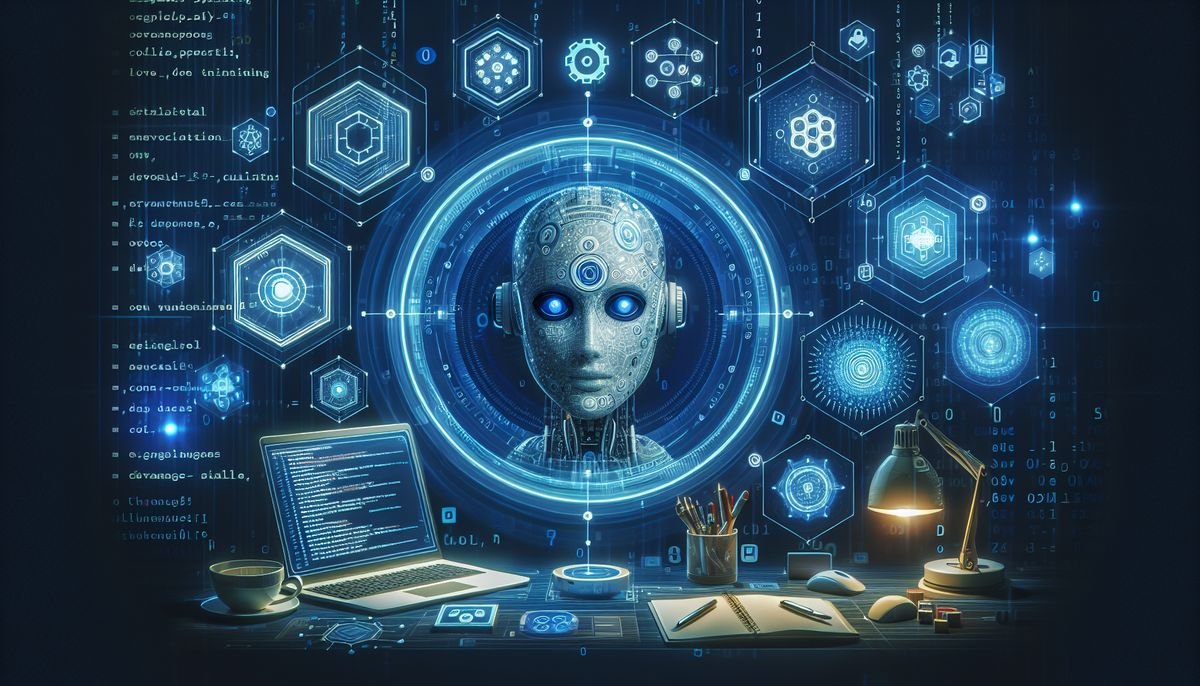The landscape of software development is undergoing a monumental shift with the integration of Artificial Intelligence (AI) in various tools and methodologies. In 2023, AI’s role in revolutionizing automated code review tools is particularly noteworthy, offering unprecedented advancements in GenAI, enhancing developer productivity, and shaping the future of programming. This article delves into the latest developments in AI-powered code review mechanisms, exploring how they are transforming the software development process and what businesses can expect from these cutting-edge technologies.
Key Takeaways
- GenAI tools like GitHub’s Copilot and Microsoft’s Intellicode are revolutionizing software development by automating routine tasks and enhancing code quality through intelligent code generation and auto-completion.
- The integration of AI in DevOps is streamlining development pipelines, from automated testing and deployment to intelligent resource management, thereby accelerating the delivery of software solutions.
- As AI reshapes the programming landscape, developers are encouraged to embrace continuous learning and adaptation to stay abreast of evolving AI tools and methodologies, ensuring the creation of sophisticated, reliable software.
Revolutionizing Software Development with GenAI
The Rise of Intelligent Code Generation and Auto-Completion
In the realm of software development, AI-driven code generation and auto-completion tools have become indispensable allies for developers. These tools, leveraging the power of machine learning, have significantly accelerated the development process by providing real-time suggestions and generating code snippets based on the context of the work at hand.
One of the most notable advancements in this area is the evolution of platforms that treat programming languages akin to natural languages. This has led to the creation of more intuitive and powerful code generators, such as OpenAI Codex, GitHub’s Copilot, and ChatGPT by OpenAI. These platforms have been instrumental in reducing the cognitive load on developers, especially when dealing with complex codebases or repetitive tasks.
The integration of AI into code generation and auto-completion is not just a convenience but a transformative force in software development, democratizing the process and enabling a wider range of people to contribute to software creation.
The following list highlights some of the key benefits that these AI code tools offer:
- Enhanced developer productivity
- Reduction in development time
- Minimized potential for human errors
- Democratization of software development
As we look to the future, the continuous refinement of these tools promises to further optimize workflows and improve software quality, making the role of AI in code generation an exciting area to watch.
Optimizing Development Workflows with AI-Driven Tools
The integration of AI into development workflows has been a game-changer for software engineers. AI-driven tools are now indispensable for optimizing development processes, offering a range of benefits from intelligent code analysis to automated DevOps practices. These tools have evolved to not only assist with code generation but also to enhance overall project management and deployment strategies.
In the realm of DevOps, AI has taken center stage. It’s not just about automating testing and deployment anymore; AI is now integral to resource management and security enhancements. By analyzing historical code changes, GenAI tools can identify patterns, predict potential issues, and provide intelligent recommendations. This leads to a more streamlined and efficient development pipeline, which is crucial in today’s fast-paced software industry.
The recent trend towards AI-embedded tools allows engineers to spend less time on routine coding tasks. Instead, they can focus on higher-level aspects of software development, such as feature design and system architecture.
Here’s a look at some of the key areas where AI is making an impact:
- Resource Planning: AI tools analyze customer requests, market trends, and user feedback to inform software requirement planning.
- Code Generation: Tools like GitHub’s Copilot and Jasper are revolutionizing the way developers write code by providing rapid code suggestions and completions.
- Automating DevOps: AI is automating various aspects of the software development and delivery processes, including testing, deployment, and cloud resource optimization.
While AI-driven tools offer numerous advantages, it’s important to remain cognizant of the challenges they present, such as data bias and privacy concerns. Nonetheless, the 10 Best AI Tools for Developers in 2024 are set to elevate the coding game to new heights.
The Impact of GenAI on Developer Productivity and Software Quality
The integration of Generative AI (GenAI) into software development has been a game-changer for developer productivity. Tools like GitHub’s Copilot and Jasper are revolutionizing the way code is generated, offering rapid development capabilities that were previously unattainable. This acceleration in code production, however, raises questions about the potential impact on software quality.
The sheer amount of code produced by AI tools could inadvertently lead to a decrease in code quality, as developers may find it challenging to thoroughly review and refine the auto-generated code.
Moreover, GenAI’s influence extends beyond mere code generation. It plays a pivotal role in automating various aspects of DevOps, optimizing cloud resource workloads, and enhancing resource planning. This multifaceted contribution is reshaping the software development landscape:
- GenAI tools analyze data such as customer requests and market trends for software requirement planning.
- Automation in DevOps streamlines the software development and delivery processes.
- Workload optimization in cloud resources is achieved through intelligent GenAI applications.
Despite the concerns, the synergy between GenAI and software development is undeniable, driving innovation and efficiency to new heights. As the industry continues to evolve, it is crucial to balance the benefits of GenAI with the need for maintaining high software quality standards.
The Future of Programming: Continuous Learning and AI Integration
Navigating the Shift to Low-Code and No-Code Platforms
The landscape of software development is undergoing a significant transformation with the shift to low-code and no-code platforms. These platforms are not only simplifying the development process but also expanding the pool of individuals who can contribute to software creation. A key trend in the past three months has been the increased adoption of these platforms by larger enterprises, signaling a move towards more accessible and agile development practices.
One of the most notable changes is the rise of citizen developers. Empowered by intuitive visual interfaces and minimal manual coding requirements, individuals with limited programming experience are now able to build applications and automate workflows. This is fostering a more inclusive and diverse coding community, as well as accelerating digital transformation across various industries.
As AI continues to integrate with low-code and no-code platforms, we’re witnessing a makeover in development priorities. The focus is shifting towards leveraging AI to enhance these platforms, making it possible for even inexperienced developers to engage with generative AI tools. However, with this integration comes the need for improved security and governance to protect the integrity of the applications being developed.
The democratization of development through low-code and no-code platforms is not just a trend; it’s a paradigm shift that is reshaping the future of software engineering.
Adapting to AI-Enhanced Development Environments
The integration of AI into development environments is not just about the tools themselves, but also about how developers interact with these tools to enhance their workflow. AI-powered IDEs (Integrated Development Environments) are becoming increasingly sophisticated, offering features like predictive coding and intelligent error correction. These advancements are not only streamlining the coding process but are also reshaping the role of the developer, who must now adapt to a more collaborative partnership with AI.
One of the most notable trends in the past few months has been the rise of AI-powered code completion tools. These tools have significantly reduced the number of keystrokes and time required for coding tasks, leading to a more efficient development process. Here’s a brief overview of the impact:
- Reduction in development time: Developers can focus on more complex problems as AI handles routine coding.
- Minimization of human errors: Intelligent suggestions help avoid common mistakes.
- Enhanced code quality: AI can suggest optimizations and best practices.
The synergy between developers and AI tools is creating a new dynamic in software creation, where the emphasis is on continuous learning and adaptation to harness the full potential of these technologies.
As we look towards 2024, the question of ‘What is an IDE and how will it be used in working with AI?’ becomes increasingly relevant. For instance, the introduction of AI-powered code completion tools in recent years marks a significant milestone, transforming how developers approach coding tasks and workflows.
Embracing Lifelong Learning in the Age of AI-Assisted Coding
In the dynamic landscape of software development, embracing lifelong learning has become a cornerstone for developers. The rapid evolution of AI-assisted coding tools necessitates a commitment to continuous education to harness their full potential. AI has proven to be a catalyst in expediting development cycles, enabling developers to focus on more complex and creative tasks.
The integration of AI into programming environments has led to significant enhancements in code quality. Advanced algorithms and machine learning techniques are now routinely used to analyze code patterns, identify potential bugs, and suggest optimizations. This proactive approach to code review not only elevates the quality of software but also ensures maintainability.
The realm of AI and ML is not static; it’s a domain of continuous advancement. The algorithms that power predictive analytics today will evolve, becoming more sophisticated and accurate.
Moreover, AI-driven low-code platforms are democratizing software development, allowing individuals with limited programming experience to contribute meaningfully. This shift is fostering a more inclusive and diverse coding community, emphasizing the importance of adapting to new tools and methodologies. As we navigate the promises and risks of AI-assisted coding, it is clear that a culture of continuous learning is essential for success.
Conclusion: Embracing AI’s Transformative Role in Programming
As we navigate through the advancements of AI in 2023, it’s clear that the landscape of programming is undergoing a significant transformation. Automated code review tools, powered by GenAI, are not just auxiliary aids but pivotal forces in reshaping software development. They accelerate development cycles, enhance code quality, and democratize programming with low-code platforms. Developers are now equipped with intelligent tools like GitHub’s Copilot, Microsoft’s Intellicode, and Jasper, which interpret programming languages akin to natural languages, thereby streamlining the coding process and boosting productivity. As AI continues to automate and optimize various aspects of DevOps, it’s imperative for developers to engage in continuous learning to harness these evolving technologies effectively. By embracing AI’s capabilities, the programming community can unlock a new era of efficiency, collaboration, and innovation, ensuring that software applications are more sophisticated, reliable, and accessible than ever before.
Frequently Asked Questions
What is GenAI, and how is it transforming software development?
GenAI refers to the next generation of AI tools that are revolutionizing software development by treating computer languages as natural languages. These tools, such as GitHub’s Copilot, Microsoft’s Intellicode, and Jasper, assist developers by generating code and offering intelligent auto-completion, significantly boosting productivity and enhancing software quality.
How do AI-driven tools contribute to the optimization of development workflows?
AI-driven tools contribute to development workflow optimization by automating routine tasks such as code review, bug detection, and testing. They use advanced algorithms to analyze code patterns, suggest optimizations, and streamline the development pipeline, which leads to faster development cycles and higher-quality software products.
What role does continuous learning play in the era of AI-assisted coding?
Continuous learning is crucial in the era of AI-assisted coding as developers need to stay updated with the latest AI tools, methodologies, and best practices. AI technologies are rapidly evolving, and embracing lifelong learning is essential for developers to harness the full potential of AI to create sophisticated and reliable software applications.



